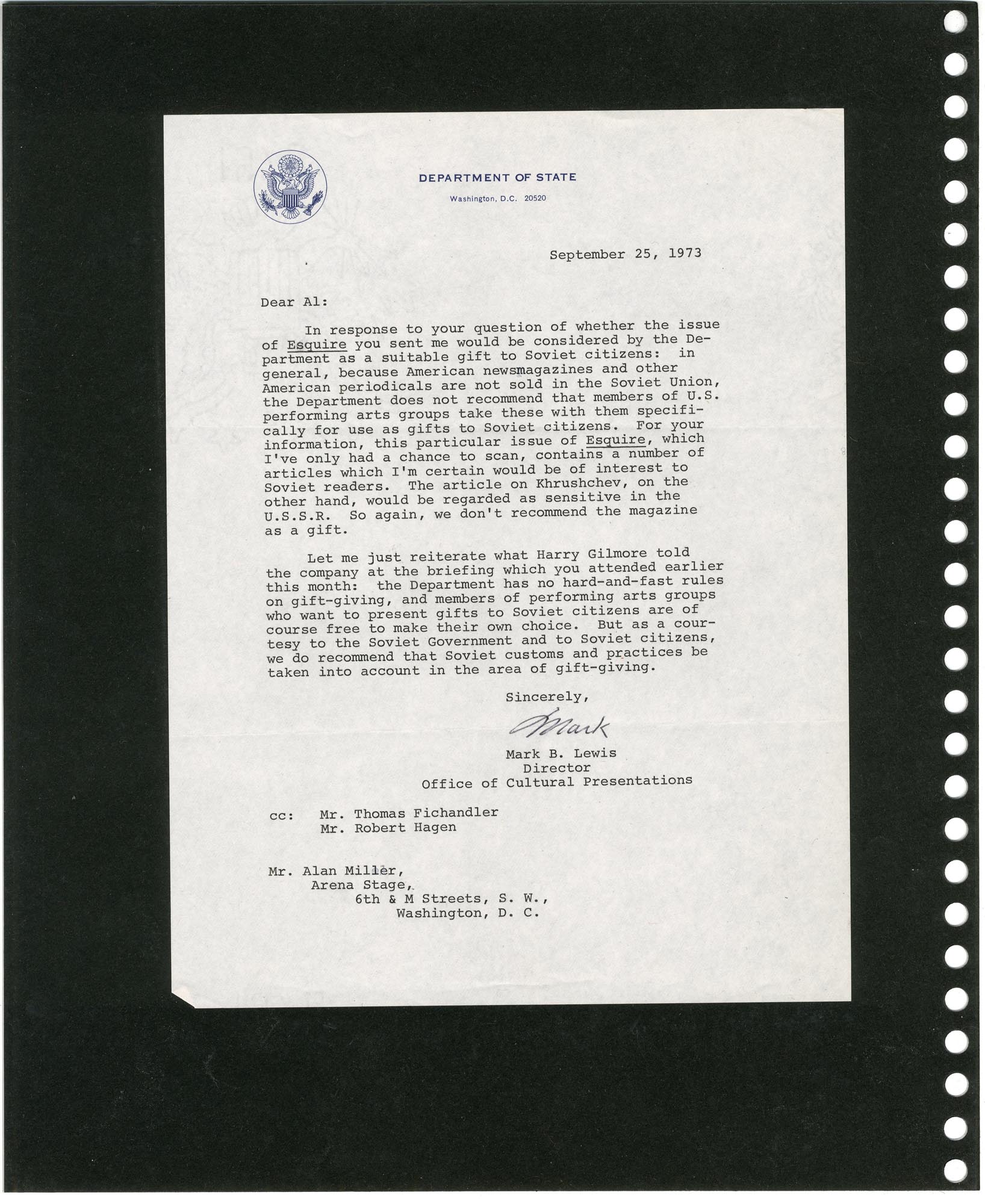This post is part of a series pertaining to SCRC’s current exhibition, Looking Over Our Shoulder: The Cold War in American Culture.
Through the Cold War years, artists working in a variety of mediums in both the United States and the Soviet Union used their work to challenge the narrative of the conflict between the two nations and their satellites around the world. Whether through theatre and film, writing, or visual art, artists advocated for demilitarization, disarmament, freedom of speech and thought, and exchange of ideas between Americans and Russians. The items on display in the Arts and Entertainment case of SCRC’s Looking Over Our Shoulder: The Cold War in American Culture exhibit all reflect these efforts to critique and push back against the tensions, whether through government-sanctioned and supported means or through anti-government action that led to consequences for the artists involved.
One artistic effort to de-escalate tensions that required government cooperation was Arena Stage’s 1973 tour of the Soviet Union. Arena (located in Southwest Washington, D.C.), a leader in establishing American professional theatre outside of New York City, was the first American theatre company to travel to and perform in the Soviet Union. Arena’s co-founder, Zelda Fichandler, studied Russian literature as an undergraduate at Cornell University, and her father immigrated to the United States from Russia;[1] these connections positioned her and her theatre company well to be artistic ambassadors to the Soviets and the Russian people. [2]
Because of the deep suspicions that developed between the Soviets and the Americans over decades of Cold War, both the artistic and logistical aspects of the tour were carefully orchestrated. The U.S. State Department sponsored the program that allowed Arena to travel to the Soviet Union as part of a cultural exchange between the two nations,[3] and as the tour scrapbook on display in SCRC’s exhibit illustrates, they were involved in minute details of the tour plans. One page of the tour scrapbook in the exhibit shows a letter from the State Department advising Arena against giving an issue of Esquire magazine as a gift while in the Soviet Union, as it contained an article about Soviet leader Nikita Khrushchev that might offend Soviet officials.

Letter from the State Department to Arena Stage advising against gifting an issue of Esquire magazine on their tour of the Soviet Union. Arena Stage Records, C0017, Box 705, Special Collections Research Center, George Mason University Libraries.
The two plays Arena performed, Inherit the Wind and Our Town, remain classics of the American theatrical cannon. Inherit the Wind, a play that fictionalizes the Scopes Monkey Trial and the right to teach evolution in American public schools, has a strong message supporting ideological liberty. As Marisa Dever notes, “Even though the Soviets helped pick the program, some with Arena worried that Soviet officials would picture themselves in the ideological debate of “Inherit the Wind”[…] The play comes down in favor of free thought, even if the trial didn’t.”[4] Whether intentionally or not, Arena brought a message of intellectual freedom to the Soviet Union, even in a moment when it was also being challenged in the United States as a result of backlash to the protest movements for Civil Rights and against the Vietnam War.
Arena’s Russian tour is just one examples of how the Cold War both impacted art and was impacted by artists’ work in turn. Others are on display in SCRC’s “Looking Over our Shoulder: the Cold War in American Culture” exhibit through January 2022.
[1] Bruce Weber, “Zelda Fichandler, a Matriarch of Regional Theatre, Dies at 91”, New York Times, July 29, 2016, https://www.nytimes.com/2016/07/30/arts/zelda-fichandler-a-matriarch-of-regional-theater-dies-at-91.html, accessed November 5, 2021.
[2] Marisa Dever, “Thawing the Cold War with Theatre,” Boundary Stones, February 2, 2017, https://boundarystones.weta.org/2017/02/02/thawing-cold-war-theatre, accessed November 5, 2021.
[3] Ibid.
[4] Ibid.
Follow SCRC on Social Media and look out for future posts on our Facebook, Instagram, and Twitter accounts. To search the collections held at Special Collections Research Center, go to our website and browse the finding aids by subject or title. You may also e-mail us at speccoll@gmu.edu or call 703-993-2220 if you would like to schedule an appointment, request materials, or if you have questions.

